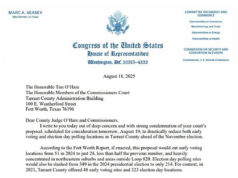A group that the Associated Press has called a “green dream team” of policy experts and scientists has concluded that the future is anything but green for groundwater resources in many parts of our country, thanks to oil and gas “fraccing” activity.
In a report released Tuesday, the Environmental Working Group concluded that oil and gas drillers are “skirting federal law” and “threatening drinking water supplies” in states from Pennsylvania to Wyoming while federal and state regulators “largely look the other way.” For North Texans, that sounds like grim affirmation of old news. But the report included disturbing new details as well.
The report zeroes in on drillers’ continued practice of injecting diesel and other petroleum distillates into wells. The reason that’s important: When Congress exempted the oil and gas industry from the provisions of the Safe Drinking Water Act in 2005, the environmental group said, it left diesel as the only drilling-related substance for which drillers were still required to get a permit.
But the Working Group said that its six-month investigation of chemical disclosure records, plus interviews with regulators in several states, showed that the industry has simply gone around that provision by using a list of distillates that are very similar to diesel “and represent an equal or greater threat to water supplies.” The list includes some petroleum products that contain almost 100 times as much benzene as diesel itself.
The group also concluded that state and federal regulators are not tracking frac fluids — certainly true in Texas — and therefore have little way of knowing whether companies are complying with the no-diesel-unless-permitted provision of the drinking-water act. The group also concluded that state and federal regulators are not tracking frac fluids — certainly true in Texas — and therefore have little way of knowing whether companies are complying with the no-diesel-unless-permitted provision of the drinking-water act. In fact, according to the report, Ramona Nye of the Texas Railroad Commission said that the commission does not even believe that the Safe Drinking Water Act applies to diesel use by drillers. And yet an Environmental Protection Agency official told the researchers that indeed, under that act, companies are required to get regulatory approval for using diesel And yet an Environmental Protection Agency official told the researchers that indeed, under that act, companies are required to get regulatory approval for using diesel.
The dangers of injecting diesel-like substances were made chillingly clear: The amount of distillates typically used in a single well, the researchers concluded, could pollute the entire daily water supply of the state of New York.
The Working Group recommended that Congress broaden the drinking water act to regulate the use of all fraccing fluids, require drillers to publicly disclose what they use in that deadly soup, investigate the lax oversight of fraccing by both state and federal agencies, and that the EPA investigate for itself whether drilling companies are using diesel and its equally toxic cousins.
And so the body of evidence grows. How long will it take before state and federal regulators take this threat seriously?
Static won’t wait up. But you should.











